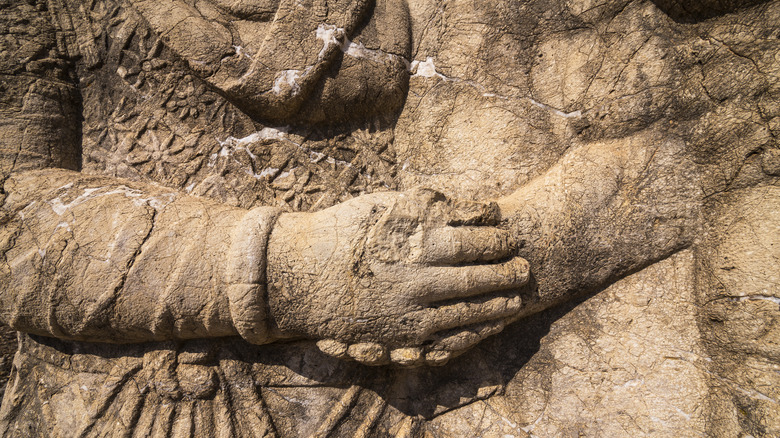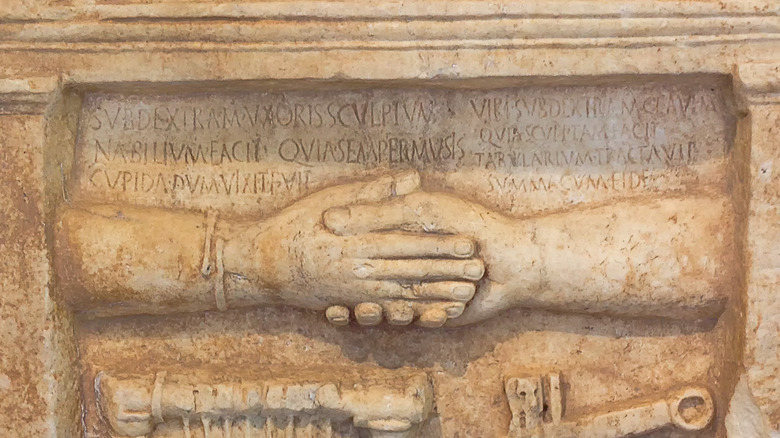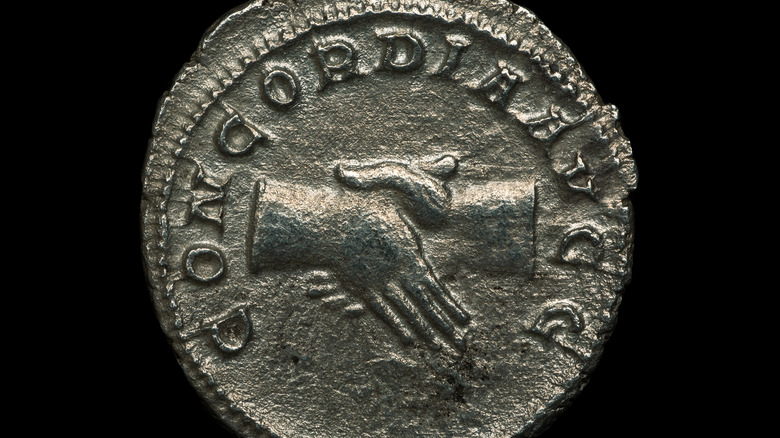These Were What Handshakes Meant In Ancient Civilizations
The handshake, a standard greeting in the United States, went without question for most of the 20th century. That changed during the COVID-19 pandemic. As the world socially distanced and masked up, many re-examined their daily routines and rituals through the lens of germs. Blowing out birthday candles, the frequency of hand-washing, and even handshakes were called into question. In April 2020, Anthony Fauci said, "I don't think we should ever shake hands ever again, to be honest with you. Not only would it be good to prevent coronavirus disease; it probably would decrease instances of influenza dramatically in this country," reports Folklife.
While Fauci's views on the handshake may seem extreme to some, warnings about the handshake's germ-spreading potential are nothing new. People have dropped the handshake when concern about germs rises as far back as the yellow fever epidemic of 1793. At the time, Philadelphia publisher Mathew Carey observed that "the old custom of shaking hands fell into such general disuse, that many persons shrank back with affright at the offer of the hand." More recently, in 1929, nurse Leila Given wrote in the American Journal of Nursing that "the hands are agents of bacterial transfer," (via Folklife).
As the world cautiously re-opens, the fate of the handshake is uncertain. However, the folklorists at the Smithsonian's Folklife argue that letting go of the handshake in times of illness is a part of the handshake tradition.
Early Handshakes
Where did the handshake originate? The paleoanthropologist Ella Al-Shamahi thinks that handshakes pre-date humans. She explains, "I would argue that the handshake ... is older than our species and that, yes, the Neanderthals did shake hands. In fact, I would say the handshake is at least 7 million years old" (via Folklife).
However, the first physical evidence of the handshake is from the ancient Mesopotamian civilization Assyria. It appears on a ninth century B.C. relief, according to History. The 3,000-year-old relief shows the Assyrian King Shalmaneser III and King Marduk-Zakir-Shumi I of Babylonia shaking in agreement over a pact, explains Folklife.
Like the Assyrian relief, the early handshake symbolized peace, alliance, and goodwill. The open hands show that participants hold no weapons, says History. Additionally, it is thought that the shaking up and down motion could dislodge any knives concealed up shirt sleeves. The historian Walter Burkert says that agreements are "only made effective by a ritual gesture: open, weaponless hands stretched out toward one another, grasping each other in a mutual handshake." We can find references to the handshake in ancient literature as well. In his epics, the Greek poet Homer referenced handshakes as "grasps," writes Folklife. According to History, Homeric handshakes communicated promises or agreements between characters. The handshake's significance as a gesture of trust and respect has lasted. The modern-day El Chapo is rumored to have ordered someone killed for ignoring his outstretched hand (via CBC).
From secret codes to bioweapons: handshakes mean trust
Over time, handshakes have served other roles. Greek funerary art — vases, reliefs, and statues included in death rites — from the fifth and fourth centuries B.C. portray handshakes, possibly symbolizing the connection between the living and the dead (via History and The Met). Grasped hands also appear on ancient Roman coins since the handshake, during that time, meant friendship, says History. Roman handshakes involved grabbing forearms, perhaps to help search for weapons, elaborates Deep English.
Handshakes have also served as hidden codes or signals. Mithraism was a prevalent religion in ancient Rome during the second and third centuries B.C. A secretive sect, the handshake was reportedly used as a signal between members of the religion, much like the secret handshakes of the Freemasons (via CBC). In the U.S., 18th century Quakers used handshakes to bring equality to social interactions. The handshake made both participants equal rather than a bow or other gestures that indicate social status (per National Geographic).
Returning to germs, some theorize that the handshake is the ultimate sign of trust. The behavioral scientist, Val Curtis, posits that giving someone your hand means that you trust them enough to share germs. You are literally putting your life in their hands (via National Geographic). Dr. Gregory Poland of the Mayo Clinic told the BBC that "When you extend your hand, you're extending a bioweapon," as Folklife notes. Then, it is no surprise that as people cautiously return to work, a new question is circulating offices: "are you shaking?" (via Folklife).


